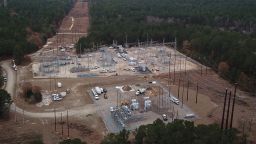A man “dedicated to white supremacist” beliefs is facing federal charges in an alleged plot to use an explosives-laden drone to blow up a Nashville energy facility “in furtherance of his accelerationist ideology,” a federal criminal complaint filed this week says.
Accelerationism “refers to a white-supremacist belief that the existing state of society is irreparable and that the only solution is the destruction and collapse of the ‘system,’” the complaint continues.
It is “premised on the idea that steps can be taken to speed up the collapse of the system, to wit: the destruction of the US power grid, among other acts of violence.”
After his arrest Saturday in Nashville, Skyler Philippi, 24, was charged with attempted use of a weapon of mass destruction and attempted destruction of an energy facility, the US Justice Department said. He’s detained without bond and due back in court Wednesday. His attorney told CNN he couldn’t comment on the case.
Philippi’s alleged plot, which could have left thousands without power three days before the US presidential election, is far from the first time America’s power grid has been seen in recent years as a target of extremists, including those devoted to accelerationism.
Electric utilities “have always taken substation security seriously,” Patrick C. Miller, CEO of Oregon-based utility security consulting firm Ampyx Cyber, told CNN in 2023.
“I think we will continue to see this as a threat, but the dynamics may change a bit with the change in (presidential) administration,” he added this week. “Historically, perceived or real differences with the administration has a tendency to drive extremist activity, and I expect that to get more fuel.”
Here’s what to know about accelerationist ideology:
‘Accelerationism is an idea, not an organization’
Accelerationism “is the belief that society has gone so wrong that it has to be burned to the ground so people can get a fresh start,” extremism expert and author J.M. Berger told CNN this week.
“Not everyone who uses accelerationist concepts will use that word to refer to themselves,” he explained, adding some adopt the theory loosely and are often not planning accelerationist-motivated activities in any coordinated way.
“Accelerationism is an idea,” Berger said, “not an organization.”
Though accelerationist ideas can be found across the political spectrum, the ideology is most popular now in right-wing and White supremacist circles, Berger said.
“Fueled by the perception that the future of the White race is bleak, these White supremacists believe they must employ any means necessary to expedite the collapse of the current system,” the Anti-Defamation League says of accelerationism. “Solutions to bring down the system range from the most extreme form, violence, to deliberate political engagement that supports destructive and divisive societal elements.”
Adherents to accelerationism believe setting off a series of reactions – even including those that may threaten “the white race” – can encourage and motivate other White supremacists, the anti-hate group said.
And while the ADL says elements of accelerationism’s principles can be traced to Marxism, “widespread use of the term is relatively recent, over the last 10 to 20 years,” Berger told CNN.
The ideology often is a popular topic in private chat rooms frequented by White supremacist, neo-Nazi groups including The Base, which is a survivalism and self-defense network, the group’s leader told CNN in 2020, and is described as a militant neo-Nazi group by the ADL and the Southern Poverty Law Center.
Accelerationism rhetoric also was embraced on Fascist Forge, an online hate forum now removed from the internet where users discussed the “optimal” type of violent action and steps to take to hasten “the ultimate collapse,” the ADL says.
Why extremists target power grids
Meanwhile, attacks on the US power grid has been the target of extremist groups’ chatter, with an uptick in 2020, the same year a 14-page how-to guide on low-tech attacks – including with guns – circulated on extremist communication channels.
“Power grids are attractive because they’re fairly soft targets that can affect large numbers of people,” Berger said. “Some extremists also target power stations notionally as rehearsal for a guerilla war at some later date.”
There were 13 “actual physical attacks” reported last year on power facilities across the US, with 25 reported in 2022, according to Department of Energy’s statistics.
“(i)f you want to do the most damage as an accelerationist, attack high economic, high tax, political zones in every major metropolis,” the defendant in the alleged Tennessee plot texted in July to a confidential source, according to the criminal complaint filed this week.
Philippi later told an undercover agent he believed “attacking power grids across the country … would lead to the collapse of the power grid in the United States,” the complaint states.
Philippi had studied previous gun attacks by accelerationists in North Carolina and California, he later told two undercover agents, and concluded “attacking the electric substations with rifles would not cripple the substations,” the complaint says.
For utility operators, “what hasn’t been considered as much, until recently, has been firearms, ballistics, drones and other threats from outside of the substation fence,” Miller, the security consultant, said in 2023, adding it “takes some planning and investment to move to a more secure posture.”
A bulletin from the Department of Homeland Security in November 2022 warned of threats by extremist groups to “create civil disorder and inspire further violence.” Days later, gunshots fired at two power substations in North Carolina left around 45,000 homes and businesses without power.
While the motive remains unknown, the attacks may have been the work of domestic extremists who had openly advocated targeting a vulnerable power system, experts said at the time. No arrests have been made in the case, and the investigation continues, Chief Deputy Andy Conway of the Moore County Sheriff’s Office told CNN this week.
The FBI Charlotte field office continues to investigate alongside the sheriff’s department and has no public updates, it told CNN this week.
CNN’s Karina Tsui contributed to this report.








